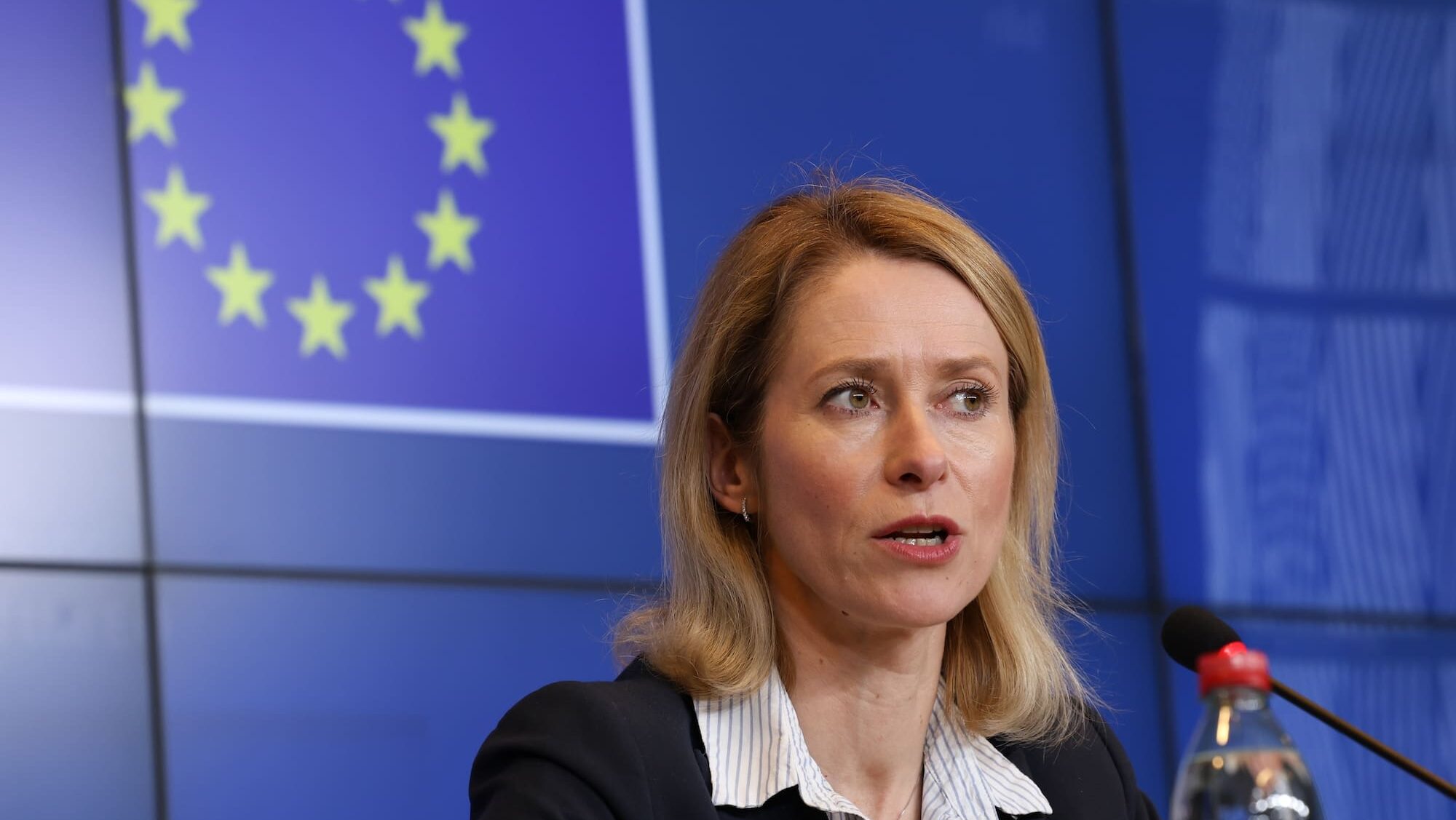
EU High Representative for Foreign Affairs Kaja Kallas
Photo: © European Council 2025
Increased military aid, new energy sanctions, accelerated EU accession for Ukraine, and the deployment of EU ‘military advisors’ inside the country are just a few of the initiatives the European Council will have to decide on next month after discussing them during the latest foreign ministerial meeting in Luxembourg on Monday, April 14th.
The new push comes a day after Russia’s large-scale missile attack on the Ukrainian city of Sumy, which killed three dozen civilians and wounded over a hundred more on Palm Sunday. The targeting of civilians earned unanimous condemnation from the West, including Washington, as U.S. officials said the “horrifying” attack “crossed any line of decency.”
After chairing the Luxembourg meeting, the EU’s foreign affairs chief Kaja Kallas began her press conference by stressing that “all member states want peace,” but the Sumy attack proves that it is Moscow—not Kyiv—that should be pressured to finally start to “negotiate seriously.”
However, she then immediately went on to state that the EU also has to ramp up its support for Ukraine, even though some of the proposals outlined would be clearly considered an escalation by Russia and hardly help the peace process.
For instance, ministers discussed whether the EU itself could participate in the security guarantees provided by Starmer and Macron’s ‘coalition of the willing,’ as well as the possible deployment of ‘military advisors’ in Ukraine, even before a ceasefire, via an existing mission that was created to train Ukrainian army personnel—such as fighter jet pilots—outside the country.
“This is a red line for us,” Hungarian Foreign Minister Péter Szijjártó said after the meeting, adding that Budapest will never agree to deploy EU military personnel to Ukraine, not even in an “advisory” function:
EU military instructors should not carry out training programs in Ukraine, as this would entail a serious risk of escalation of the war toward Europe.
A set of fanatic, pro-war initiatives at today’s #FAC. Billions more for Ukraine, more weapons, deploying military advisers, new sanctions on nuclear energy & push to open all accession chapters this year. We support none of it. Time to end the failed policy of the last 3 years. pic.twitter.com/BfXFBbo3xM
— Péter Szijjártó (@FM_Szijjarto) April 14, 2025
The EU Council also once again discussed providing further military aid to Kyiv under the so-called “Kallas plan” for up to €40 billion this year. The plan was initially supposed to be adopted by EU leaders last month before it was suddenly vetoed by France, Italy, Spain, and Portugal for “budgetary reasons.”
So, while the giant package has been put on the back burner for now, Kallas focused on a smaller initiative to deliver two million artillery rounds, worth about €5 billion, announcing that two-thirds of that figure has already been pledged by EU member states and Norway.
Apart from that, EU countries have collectively provided over €23 billion in military aid in 2025 so far, already surpassing the total figures for last year. Nonetheless, “we still have room to go,” Kallas added, hinting that the €40 billion joint package remains on the table.
Another item high up on the agenda was the EU’s next sanctions package on Russia—the 17th, to be exact—which would primarily focus on Moscow’s “shadow fleet” of oil tankers that bypass existing restrictions by flying different nations’ flags. While there is not much debate about the need to enforce previous sanctions, there are other, more controversial proposals for the new sanctions package.
For one, the Council reportedly discussed sanctions on nuclear energy (nuclear fuel or power plant components), which is another red line for some Central European countries that operate Russian-made plants; and possibly deepening the existing measures on Russian gas and oil.
At the same time, Kallas dodged a question about imposing sanctions on Russian liquified natural gas (LNG)—unsurprising, given that Russian LNG exports to the EU have reached record heights since the start of the war. Around 90% of the total volume is bought by France, Belgium, and Spain, who previously blocked every initiative to sanction LNG and hurt their considerable re-export business.
Ministers also discussed putting Russian diplomats and government officials on the EU sanctions lists, which was criticized again by Hungary for potentially hindering the ongoing peace negotiations.
Finally, Ukraine’s fast-tracked EU accession was also on the table, with some member states pushing to open all negotiation chapters simultaneously, even though these modules were designed to build on each other and provide a thorough and gradual pathway to EU membership.
Doing them all at once could, in theory, help meet the 2030 target floated by Brussels, but it also risks admitting Ukraine into the EU without proper oversight of whether it meets the Copenhagen criteria.
“So more weapons, more money, pushing Ukraine into the EU, sending military advisors to Kyiv, and sanctioning energy purchases,” Szijjártó summarized the latest initiatives.